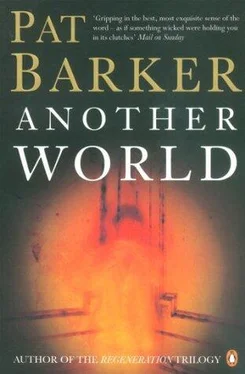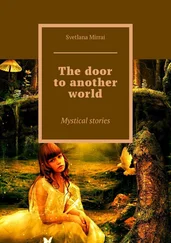‘Fear of death? Pretty powerful trigger.’
‘I don’t know.’
‘How’s he going to manage?’
‘Frieda’ll look after him during the day — he’s all right then — I’ll do the nights.’
‘And what does Fran think about that?’
‘She doesn’t know yet.’
‘Sure you wouldn’t rather have a whisky?’
He smiles. ‘I think I’ll take you up on that. But only a small one, I’m driving.’
‘You could walk from here.’
‘If I turned up sozzled I would be in trouble.’
‘Small one, I promise.’
While she’s out of the room, Nick passes the time looking along her bookshelves and, for the second time that evening, identifies the red cover of Soldier, from the Wars Returning . This time he opens it and Geordie’s voice leaps off the page.
GEORDIE: Like Rip Van bloody Winkle, I suppose. You don’t hear that story much now, do you? We got told it at school. Friday afternoons, we used to have a story, last lesson before the bell, and that one sort of stuck in me mind. I remember walking home from school — four miles, it was, there and back twice a day — they’d think it was child abuse these days — and thinking all the time about this man going to sleep on the hillside, and waking up years later, and nobody knowing who he was. It haunted me. I used to think it was awful.HELEN: What in particular?GEORDIE: The loneliness.
Helen’s focus in the book was on the interaction between the individual veteran’s memories of his combat experience, and the changing public perception of the war. Geordie, from the moment she met him, intrigued her, not merely because he was old enough to remember the trenches, and remembered them clearly, but because he had, at different stages of his life, coped with his memories in radically different ways.
As a young man just back from France, Geordie refused to talk about the war, and avoided all reminders of it. Every November he wore a poppy, but he took no part in Armistice Day commemorations. Instead he went for a long walk in the country, returning well after dark, exhausted and silent as ever. Refused all questions. When obliged to speak stammered so badly he could barely make himself understood. This was the man Nick remembered.
Then, in the sixties, Geordie began to talk about the war. Over the next three decades his willingness to share his memories increased and, as other veterans died around him, his own rarity value grew. In the nineties he was one of a tiny group of survivors who gathered for the anniversaries of the first day of the Somme, and most of the others were in wheelchairs. There were rewards in this for him. He was sought after, listened to, he had friends, interests, a purpose in life at an age when old people are too often sitting alone in chilly rooms waiting for their relatives to phone. But the sense of mission was genuine. His message was simple: It happened once, therefore it can happen again. Take care .
And the stammer? The stammer vanished or, at least, was reduced to a slight hesitation that had the effect of concentrating his listeners’ attention on the next word.
Helen was interested in the reasons for these changes, in the social forces that had obliged the young Geordie to repress his memories of fear, pain, bitterness, degradation, because what he had thought and felt at that time was not acceptable. A later generation, fresh from a visit to Oh! What a Lovely War , the Dies Irae of Britten’s War Requiem pounding in its ears, couldn’t get enough of fear, pain, etc. The horror, the horror. Give us more. Suddenly a large part of Geordie’s experience was ‘acceptable’, though still not all.
Towards the end of the published interview, Helen attempted to get Geordie to see that he still hadn’t been asked to talk about class, the different experiences of officers and men, profiteering, the whole idea of the war as a business in which some people suffered and died to make others rich, though this bitterness, as much as the anguish of grief for lost comrades, had shaped and framed his experience of the post-war years. He was still, Helen believed, remaking his memories to fit in with public perceptions of the war, only now he was working to a different template.
She tried to get Geordie to frame his war experience in terms of late-twentieth-century preoccupations. Gender. Definitions of masculinity. Homoeroticism. Homo- what? asked Geordie. Helen, with her Oxford First. Geordie, with his board-school education, shovelled into one dead-end job at the age of fourteen and then, aged eighteen, into another. It was an unequal contest. Geordie won.
‘Penny for them?’ Helen says.
Nick feels cold glass against his fingers and takes the whisky. ‘Oh, I was just thinking about this.’ He shows her the book. ‘I don’t suppose you’ve still got the transcripts, have you?’
‘Yes, somewhere. In the department, I think.’
‘May I borrow them? I mean, I’d get them photocopied and let you have them back.’
‘No problem. I’ll look them out.’ She curls up on the sofa, and chinks the ice in her glass. ‘You know, I went with him to the Imperial War Museum and he was in the trench talking to these kids and they were saying, “Was it like this?” And he was saying, “Well, this is pretty good, but in the real trenches there were rats and dead bodies and horrible smells, and bombs falling and it was cold and it was wet and it was noisy and you were fed up and you were frightened and you wanted to go home.” And of course the kids lapped it up. There were two little boys racing up and down the trench making machine-gun noises. You know?’ She rakes the room with an imaginary machine-gun. ‘And I said to Geordie, “Are you sure this is doing any good?”’
‘And he said?’
‘ “Yes.”’ She laughs. ‘He never doubted it.’
Silence. Nick takes a gulp of whisky and waits for the question he knows is coming.
‘What do you think?’
‘I’m not a historian.’
‘No, but you must have an opinion.’
‘Well, you see the first thing is I don’t believe in public memory. A memory’s a biochemical change in an individual brain, and that’s all there is. There’s quite a lot of evidence that traumatic memories are stored in a different part of the brain from normal memories, and that’s what makes them so incredibly persistent. And so… almost hallucinatory. They’re not accessible to language in the same way. It’s like watching a film, or… or even worse it’s like acting in a film.’ He spreads his hands. ‘As for warnings and messages… I don’t know.’ A spurt of anger. ‘Anyway what is the message? You look back over the whole horrible blood-sodden mess. Isn’t the real message: You can get away with it .?’
“And yet you went to the battlefields with him.’
‘Somebody had to. He couldn’t have managed on his own.’ Nick wants to tell her about Thiepval, but there’s no time, he ought to be going. And anyway he hasn’t succeeded in telling himself about Thiepval yet. ‘Thanks.’ He puts down the empty glass. ‘I needed that.’
‘I’ll look out the transcripts,’ she says, opening the door. ‘And you’ll let me know when he’s ready for a visit?’
The August night’s cool, rather than cold, yet he shivers, an automatic reaction to the glitter of moonlight on cobbles and the stars pricking sharply through the telegraph wires that score the sky. The car smells musty, a mess of cardboard cartons left from the family’s last outing litters the back seats. Curried chips, his nose tells him. Gareth’s favourite. He wonders as he fumbles with the ignition key if he’s fit to drive. He’s well under the limit for alcohol, but he seems to be getting more tired by the minute, as if all the energy he’d expended over the last few weeks, moving and decorating, had been borrowed and the loan’s just been called in. His hands hurt where the wallpaper scraper rubbed off the skin. He yawns and yawns again, as the car at last sputters into life. He’ll go the back way, he decides. It’s a bit longer, but, at this time of night, there’ll be next to no traffic.
Читать дальше












